
Organics
metrics 2024
Exploring the Depths of Organic Chemistry Knowledge
Introduction
Organics is a peer-reviewed journal dedicated to the advancement of research in the field of organic chemistry, published by MDPI, a renowned leader in open access publication. Since its inception in 2020, the journal has embraced an open access model, ensuring that cutting-edge research is freely available to researchers, professionals, and students worldwide. With a current impact factor reflecting its relevance in the community, Organics aims to provide a platform for high-quality research, reviews, and insights that foster innovation and collaboration in the organic chemistry domain. The journal's scope encompasses a broad range of topics within organic chemistry, making it an essential resource for those involved in various research endeavors. As it converges from 2020 to 2024, Organics is set to build on its solid foundation and enhance its scholarly contributions by attracting significant research contributions that align with the latest scientific developments. Based in Basel, Switzerland, the journal's commitment to quality and accessibility resonates strongly with today's research landscape, making it a pivotal asset for anyone invested in the future of organic chemistry.
Metrics 2024
 -
- 1.40
1.40 1.50
1.50 -
-Metrics History
Rank 2024
IF (Web Of Science)
JCI (Web Of Science)
Quartile History
Similar Journals
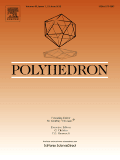
POLYHEDRON
Unveiling the Complexities of Molecular Structures.POLYHEDRON is a prestigious academic journal published by Pergamon-Elsevier Science Ltd, specializing in the fields of Inorganic Chemistry, Materials Chemistry, and Physical and Theoretical Chemistry. With its ISSN 0277-5387 and E-ISSN 1873-3719, the journal has been a significant outlet for groundbreaking research since its inception in 1982 and continues to be influential for scholars and practitioners. As of 2023, it holds a Q3 quartile ranking across its categorization, underscoring its impact within the scientific community with respectable Scopus Rankings that place it in the top percentiles of relevant fields. Situated in the United Kingdom, POLYHEDRON aims to foster the exchange of innovative ideas and findings related to polyhedral molecules and structures, making it an essential resource for researchers seeking to expand their knowledge and contribute to these dynamic areas of study. While currently not an Open Access journal, it remains committed to advancing education and research by providing quality content that serves both academic and practical applications.
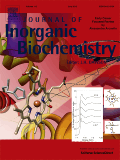
JOURNAL OF INORGANIC BIOCHEMISTRY
Charting New Frontiers in Inorganic BiochemistryJOURNAL OF INORGANIC BIOCHEMISTRY, published by Elsevier Science Inc, is a pivotal journal dedicated to exploring the intricate intersections of biochemistry and inorganic chemistry. With an ISSN of 0162-0134 and an E-ISSN of 1873-3344, this esteemed journal has been a key resource since its inception in 1979, converging its insights through impactful research projections until 2024. Currently ranked #18 out of 79 in Inorganic Chemistry, placing it in the 77th percentile, and #144 out of 438 in Biochemistry, at the 67th percentile, the journal showcases a diverse array of studies that contribute significantly to understanding the roles of inorganic compounds in biological systems. Although it does not offer open access, the journal remains integral in fostering rigorous academic discourse among researchers and professionals keen on advancing the field. With a Category Quartile ranking of Q3 in Biochemistry and Q2 in Inorganic Chemistry, it serves as a critical platform for scholars aiming to disseminate cutting-edge findings and stimulate scholarly engagement in this dynamic area of study.

JOURNAL OF CLUSTER SCIENCE
Exploring the Frontiers of Cluster ScienceJOURNAL OF CLUSTER SCIENCE, published by SPRINGER/PLENUM PUBLISHERS, is a prominent and influential journal in the fields of Biochemistry, Chemistry, Condensed Matter Physics, and Materials Science. With an ISSN of 1040-7278 and E-ISSN of 1572-8862, this journal has been contributing to scientific discourse since its inception in 1990 and continues to publish cutting-edge research through 2024. It holds a respectable position in the academic landscape with its category quartiles indicating a Q3 ranking in Biochemistry and Q2 rankings in Chemistry, Condensed Matter Physics, and Materials Science as of 2023. The journal's noteworthy Scopus rankings further underscore its relevance, particularly a rank of #82 in Condensed Matter Physics, showcasing its impact and the quality of research disseminated. Although it does not currently offer open access options, it remains a key resource for researchers, professionals, and students who are invested in understanding the complexities of cluster science and its interdisciplinary applications.

Inorganics
Connecting Scholars through Inorganic InsightsInorganics is a vibrant, peer-reviewed Open Access journal dedicated to advancing the field of inorganic chemistry, published by MDPI since 2013. Based in Switzerland, this journal aims to provide a dynamic platform for researchers, professionals, and students to share groundbreaking findings, fostering collaboration and innovation within the global scientific community. With an impressive Q2 ranking in the category of Inorganic Chemistry as of 2023, Inorganics stands out as a significant conduit for high-quality research that spans a wide range of topics from coordination compounds to metal-organic frameworks. Its commitment to accessibility ensures that cutting-edge research can be accessed, utilized, and built upon by a diverse audience, thereby amplifying its impact. Join the conversation in Inorganics and contribute to the ever-evolving landscape of inorganic chemical research.
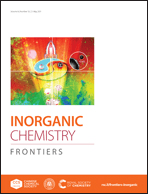
Inorganic Chemistry Frontiers
Fostering Global Insights in Inorganic ChemistryInorganic Chemistry Frontiers, published by the esteemed Royal Society of Chemistry, stands at the forefront of advancements in the field of inorganic chemistry, boasting a prestigious Q1 ranking in its category as of 2023 and an impressive Scopus Rank of #3 out of 79, placing it in the 96th percentile. Since its inception in 2014, this journal has provided a robust platform for high-quality research that spans the diverse and rapidly evolving areas of inorganic chemistry. As an open-access journal, it ensures that the findings presented are readily accessible to researchers, educators, and practitioners globally, fostering an inclusive environment for the dissemination of knowledge. With its rigorous peer-review process, Inorganic Chemistry Frontiers aims to facilitate interdisciplinary dialogue and innovation, making it an essential resource for anyone dedicated to exploring the myriad applications and theoretical advancements within inorganic chemistry.
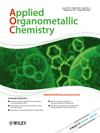
APPLIED ORGANOMETALLIC CHEMISTRY
Connecting researchers with groundbreaking insights in chemistry.Applied Organometallic Chemistry, an esteemed publication by Wiley, serves as a pivotal resource in the field of organometallic chemistry, offering researchers, professionals, and students a platform to disseminate and access significant findings since its inception in 1987. With its ISSN 0268-2605 and E-ISSN 1099-0739, the journal consistently ranks in the Q2 category for both Chemistry (Miscellaneous) and Inorganic Chemistry, showcasing its relevance and rigor within the academic community. Renowned for its commitment to high-quality research, it boasts impressive Scopus rankings, positioned at #11 out of 79 in Inorganic Chemistry, placing it within the 86th percentile. The journal’s scope encompasses a broad spectrum of topics, aiming to expand the frontiers of knowledge in the graphics of organometallic applications, synthesis, and theory. Researchers are invited to contribute original articles, reviews, and significant insights to further enhance the journal’s impact in advancing the understanding of organometallic systems. Applied Organometallic Chemistry is not only a cornerstone for experimental research but also a vital resource for scholarly debate and innovative ideas in the scientifically vibrant landscape of chemistry.

RUSSIAN JOURNAL OF COORDINATION CHEMISTRY
Unraveling Complex Interactions in ChemistryThe Russian Journal of Coordination Chemistry, published by Pleiades Publishing Inc, stands as a significant contribution to the field of coordination chemistry, focusing on the intricate relationships between metal ions and organic molecules. With an ISSN of 1070-3284 and an E-ISSN of 1608-3318, this journal has been curating high-quality research since its inception in 1996. Though it currently does not offer open access, the journal plays a crucial role in disseminating innovative findings, evidenced by its Q3 ranking in both Chemical Engineering and Chemistry categories as of 2023. With Scopus rankings placing it in the 40th percentile among general chemistry and chemical engineering journals, it demonstrates a commitment to advancing knowledge in these vital areas. The journal invites researchers, professionals, and students alike to engage with its comprehensive articles that explore both theoretical and practical aspects of coordination chemistry, supporting the development of new applications and techniques within the field.
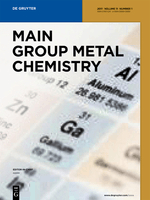
MAIN GROUP METAL CHEMISTRY
Enhancing Visibility in Metal Chemistry ResearchMAIN GROUP METAL CHEMISTRY, published by De Gruyter Poland Sp. z o. o., is an esteemed open access journal that has made a significant impact in the fields of Chemistry, Condensed Matter Physics, and Materials Science since its inception in 1988. With its ongoing publication aimed at advancing scholarly discourse until 2024, this journal is indexed in leading databases and has earned a diverse readership due to its rigorous peer-review process and relevant contribution to the understanding of metal chemistry. In the 2023 category quartiles, it has been recognized as Q2 in Metals and Alloys and holds Q3 rankings in Chemistry (miscellaneous), Condensed Matter Physics, and Materials Chemistry, showcasing its interdisciplinary appeal and recognition in the scientific community. The journal's innovative open access model, implemented in 2019, enhances visibility and accessibility for researchers worldwide, fostering collaboration and discovery among professionals, students, and academics alike. By presenting high-quality research and critical reviews, MAIN GROUP METAL CHEMISTRY serves as a vital resource for those seeking to deepen their understanding of metal interactions and their applications in advanced materials.

RUSSIAN JOURNAL OF INORGANIC CHEMISTRY
Pioneering Research in the World of InorganicsThe Russian Journal of Inorganic Chemistry is a distinguished publication that delves into the fundamental and applied aspects of inorganic chemistry. Published by MAIK Nauka/Interperiodica/Springer, this journal has established itself as a vital resource for researchers, professionals, and students alike, contributing significantly to the fields of Inorganic Chemistry, Materials Science, and Physical and Theoretical Chemistry. With an ISSN of 0036-0236 and an E-ISSN of 1531-8613, the journal is indexed for easy access and citation. Though the journal currently operates under a subscription model, its commitment to disseminating high-quality research and fostering scientific discourse remains steadfast. The journal has been maintaining a consistent record since its inception, and its positioning in the Q3 quartile across various chemistry categories in 2023 underscores its relevance in the academic community. As it continues through its converged years from 1996 to 2024, the Russian Journal of Inorganic Chemistry plays a pivotal role in enhancing the understanding and advancement of inorganic chemistry, making it an indispensable tool for anyone engaged in this dynamic field.
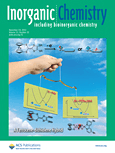
INORGANIC CHEMISTRY
Fostering Excellence in Inorganic Chemistry ScholarshipInorganic Chemistry, published by the American Chemical Society, stands at the forefront of the field of inorganic and physical chemistry, boasting an impressive impact in the academic community with a 2023 classification in the Q1 quartile across multiple categories including Inorganic Chemistry and Miscellaneous Chemistry. Since its inception in 1962, this esteemed journal has been a crucial platform for disseminating groundbreaking research, innovative methodologies, and comprehensive reviews integral to understanding the complex behaviors of inorganic materials. With a ranking of #12 out of 79 in Inorganic Chemistry and #37 out of 189 in Physical and Theoretical Chemistry according to Scopus metrics, Inorganic Chemistry has established itself as a premier destination for researchers, professionals, and students alike, eager to stay abreast of pivotal developments and trends in the discipline. Despite being a subscription-based journal, its esteemed reputation and critical contributions make it essential for anyone engaged in the exploration of inorganic chemical phenomena. As it prepares to converge into a new era by 2024, the journal continues to embody excellence and innovation, fostering a dynamic exchange of ideas essential for advancing this vibrant area of science.